Reza Esmaili still has fond memories of his Marin childhood, when his father and his friends would pass around bottles of cold vodka deep into the warm summer nights. By the time he started attending college in San Francisco, he was working in restaurants and nightclubs, and his path was soon clear. He signed up at Gordon’s House of Fine Eats and eventually partnered on Pesce. He’s since worked at Conduit and Smuggler’s Cove. Most recently, Esmaili became an operating partner in Long Bar on Fillmore. He’s currently updating the aesthetic, identity and possibly the name. In the meantime, the President of the Northern California Chapter of the United States Bartenders Guild joined me at Long Bar to discuss his background and approach.
Josh Lurie: Are you a bartender or mixologist, and what’s the difference?
Reza Esmaili: I’m a restaurateur, and the bar is an integral component to an extraordinary dining and/or drinking experience.
[It’s the end of the night at Long Bar, and Esmaili begins to make us each a cocktail.]
JL: What are you making?
RE: I’m making a cocktail that just has some of my favorite ingredients. It’s certainly indicative of a style of cocktail that I like, which has a strong spirit and liqueur component. I’m a big fan of aperitivo style cocktails that are aromatic and well balanced but still have heart…This is an aromatic cocktail that has kind of a smoky, smoldering minerality from the mezcal. I love the dry nutty spice components of Antica formula vermouth. I’m a huge fan of Averna and its richness and burnt orange maple complexities, and then the dry vermouth to lengthen all those flavors and allow them to complement one another and accent one another’s complexities.
JL: Do you have a name for it?
RE: I don’t. This is kind of something I decided to stir up on the fly for us. I love all these ingredients respectively on their own. I drink them in different combinations of one another or other spirits. As I mentioned, right now my priorities are business, and getting this restaurant running to where I would like to see it. This is just something that I would like to enjoy with you. It’s possible that it might end up on a list, or a variation thereof, but it’s just something I wanted to prepare for us to drink. I know you came from dinner and I wanted to complement that experience. I thought this would be your last, or one of your last, cocktails of the night, so something with these aromatics, this richness, and the spice component, I thought would be just the right style of cocktail.
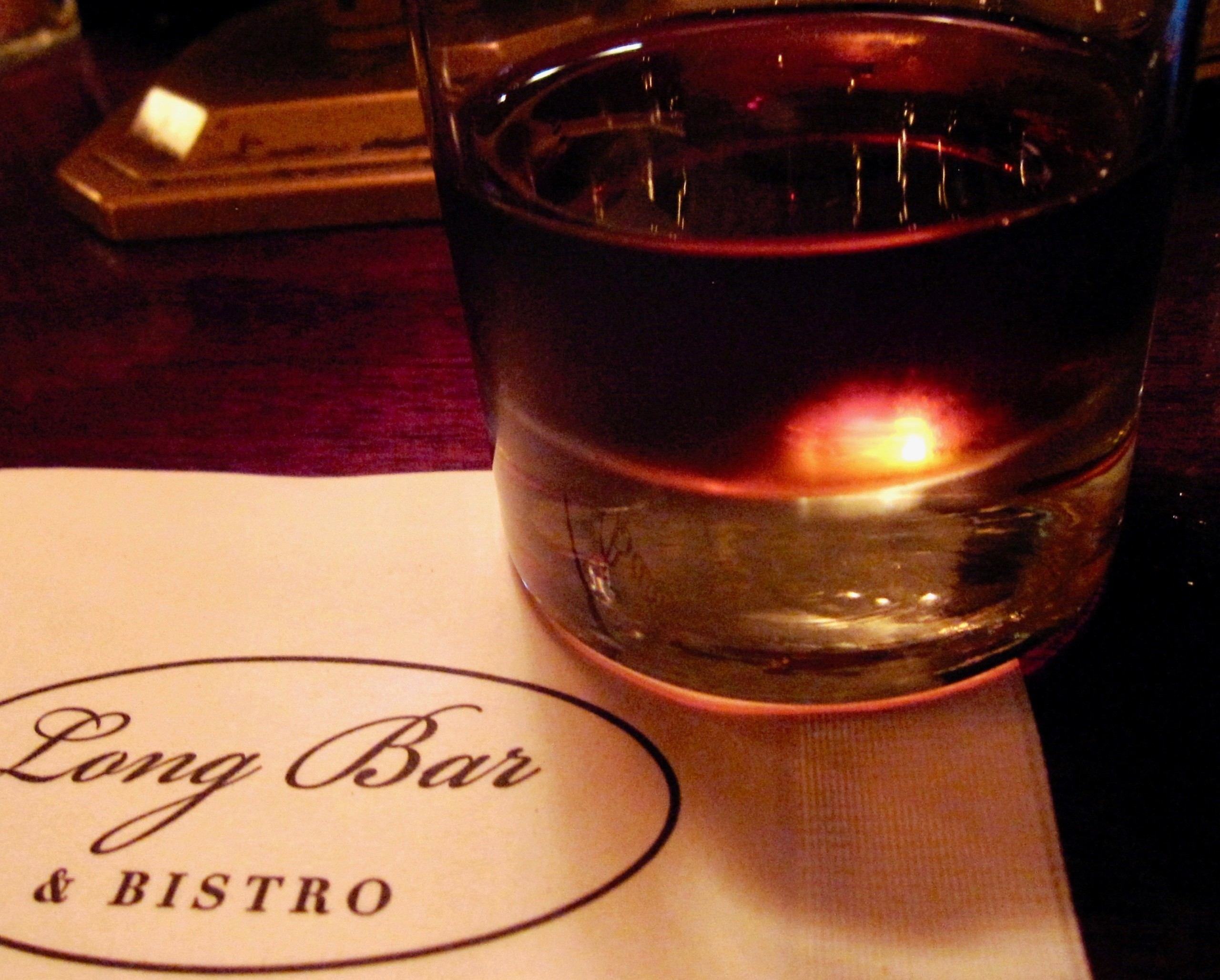
Esmaili’s aromatic cocktail combined mezcal with Antica formula vermouth and Averna.
JL: Did anybody else in your family work in the hospitality industry?
RE: No, my mother was a civil rights attorney in Iran, and my father was a self-made entrepreneur and property developer, but they both have a knack for relating well to people, and entertaining, and they’re kind and generous. My upbringing with them led to my philosophy.
JL: Do you have a first cocktail memory?
RE: My father had a bar in his house. Two things Iranians love are Scotch and ice cold vodka. Pretty much every Iranian household would have a bottle of Russian made Stoli, nice and frosty in the freezer. I remember my father and his friends sitting out in our backyard literally on a blanket on the green, and they’d enjoy an entire liter of near slushy Russian-produced Stolichnaya vodka with this yogurt raisin dill cucumber dip, that was either enjoyed by the spoonful or with a little bit of pita bread. Then to wash it down with this ice cold, now viscous chilled vodka. That one really resonates for me, because, again, Persian cuisine is so aromatic, delicate, graceful. And even the way in which they’re slamming the vodka was still done with a little bit of that perspective. Its texture, the temperature, and the environment they were enjoying it in, was just as important as the actual introduction of large amounts of distilled spirit into their body in a short period of time.
JL: That’s pretty hardcore.
RE: Yeah.
JL: Did you end joining them at some point?
RE: I caught on really quickly. My friends and I would duplicate the actions that we saw of our fathers, at an early age. That’s perhaps eventually what ended up leading to my love-hate affair with vodka.
JL: Will you have any vodka cocktails on the menu here?
RE: Absolutely, because say what you like, it is still a really dominant spirit in the world, and it is not my job as a hospitality professional to force my personal bias or opinion. Certainly I take pride in sharing what I care for, but also, at the end of the day, it is my job to tend to my guests’ needs. Also, I would love to expose them to other elements and tastes, but it’s my job to serve them, and I pay attention to that priority. It’s a challenge to first provide thoughtful, complex vodka cocktails, or present vodka outside of a way that it’s normally perceived by the people who make it the number one sold spirit in the world.
JL: Where did you go to school?
RE: I went to school in Marin. I went up to Davis for a short term but hated that, because I was not studious enough for it. I came back and went to school at San Francisco State, and that’s when I took all the jobs in the nightclub and hotel industry. I was exposed to both the young party scene of San Francisco, but also the old world, old money, fine dining, vermouth and vodka drinking clientele of Nob Hill and Pacific Heights through my guests at the Fairmont Hotel. So it’s this juxtaposition of being an early twentysomething working in night clubs, after working in my hotel fine dining, taking the [cart] out to the table and carving a porterhouse steak and doing the French service with all the accoutrements. Then I’d change, clock out of my union hotel job and go be the VIP doorman until six o’clock in the morning at 1015 Folsom.
JL: What was your focus of study at school?
RE: The study of human movement, kinesiology. I wanted to become a physical therapist and heal people with my interaction with them. In a sense, I still do that, except my medium is now food, beverage and experience, rather than the direct healing with my hands.
JL: Tell me about the progression of your career, beginning with Gordon’s House of Fine Eats.
RE: I was “forced” into taking over a super cool bar program, and I quickly realized that the program that was laid out for me was the proper way to serve cocktails and spirits, in thoughtful, balanced, occasion, event or weather appropriate presentations. From there it became my own personal thing. I grew up in a culture where food and hospitality were innate. Persians are renowned for their hospitality in almost self-sacrificing ways. I was really a big fan of food. It was a great experience with my parents at house parties and watching how they treated their guests. Almost expressive of humility. That’s the denominator in hospitality, is a sense of humility. No matter how successful you are or not, or how talented you are in this field or any other, when you have guests in your home, it is a sign of greatness and strength of character to humble yourself for their explicit or implicit needs. It’s just kind of the way that I grew up, how I saw my parents treating guests. For lack of a better reason, that’s just what I felt was the right way to do it.
JL: After Gordon’s House of Fine Eats, where did you end up working?
RE: I was introduced by a former partner and investor to a gentleman named Ruggero Gadaldi, who was the chef-owner of a restaurant on Polk called Antica Trattoria. He had this Pesce restaurant concept that had been open for a year, but was not really doing as well as he perceived it. They brought me in to be their front of the house guy, and to be the heart and soul of the concept. We got off to a pretty successful start. I learned about Italian food and wine. I had been exposed to it, obviously, as a consumer, but not as a professional. I was thrown into learning about specialty, esoteric, eclectic Italian varietals, blends and the cuisine of Veneto, which has a lot of Mediterranean influence, then imparted that to my chef, my guests, our staff and our environment, really achieved a level of great success that was documented by local and national publications, and most importantly, people within a ten-minute walking distance, and my friends and family.
JL: Where’d you go from Pesce?
RE: I was at Pesce for six years, and I left there in 2006. Interestingly enough, in my second year of business I got us a liquor license and was able to put together a small but well thought out cocktail program and was fortunate enough to have the talents of Marcovaldo Dionysos and Jacques Bezuidenhout, both working in this 56-seat northern Italian neighborhood seafood bar on Polk Street. To have those guys at my bar was amazing. Again, there was that period of my interacting with their vast spirits knowledge, and also their technique, and using proper tools and applications thereof, and me exposing them to proper service and wine, and how those worlds complement one another. We all walked away from that experience better hospitality professionals, each one exposing the other to their area of specialty. It was there that I went from citrus heavy, herb-driven, California-style muddled cocktails into really cognitive, complex, drier spirit- or liqueur-driven cocktails, I suppose what some people would like to call “the New York style,” although those lines are now completely blurry. We, from the East to the West Coast, are now just as expressive of community.
JL: Would that be possible without the USBG?
RE: I certainly think that was a great catalyst for an exchange of ideas and talent, literally by going from city to city, or just having chapter cities that you would converse with. From an organizational standpoint, as President, I talk with a lot of other Chapter Presidents constantly, and we have national events where we all congregate. But also we encourage our members to interact with one another. Thanks to the support of media, the beverage trade, and consumers, there’s an ability for cocktails to be in the national spotlight now. So there’s opportunities to travel and stage at different friends’ bars. Again, bringing each of those regional specialties together into a national collective.
JL: Clearly you put a lot of time and energy into the USBG. What is it that inspires you about the organization and your commitment?

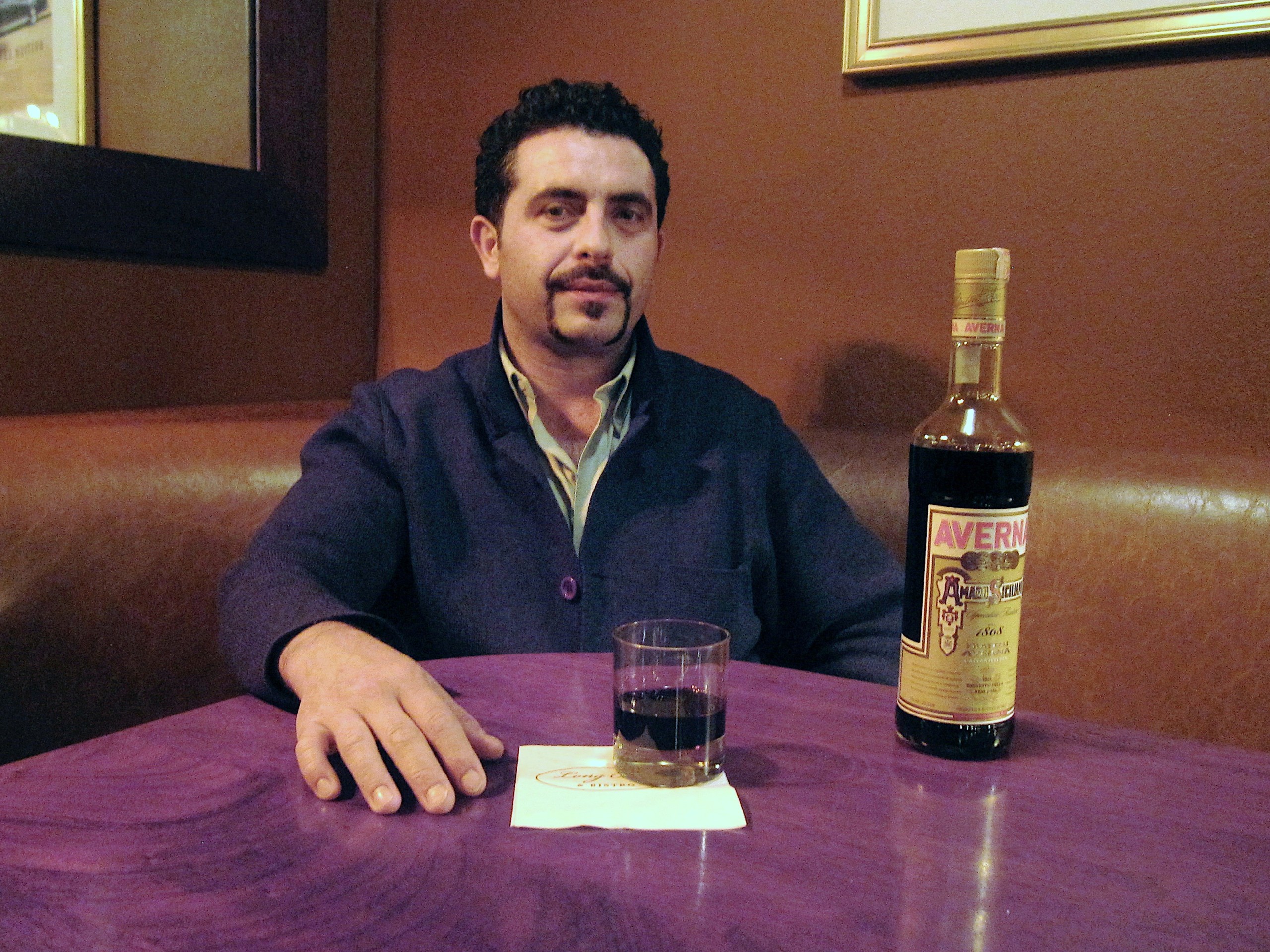
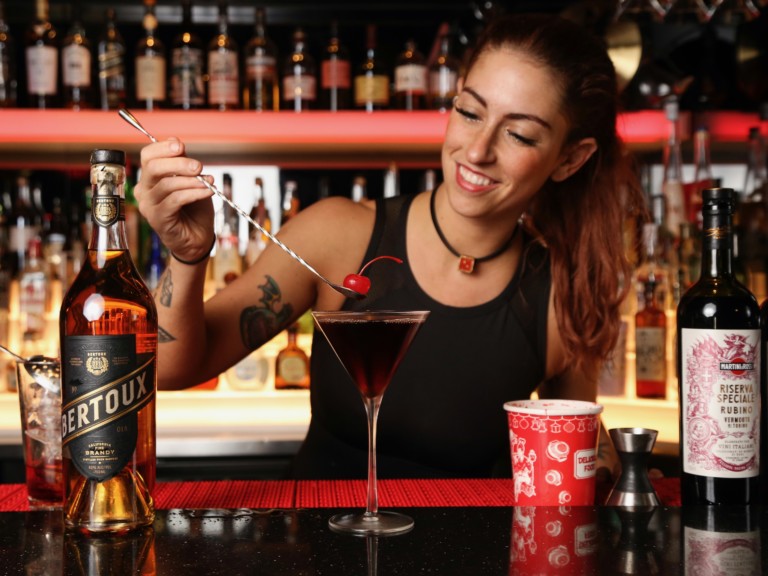
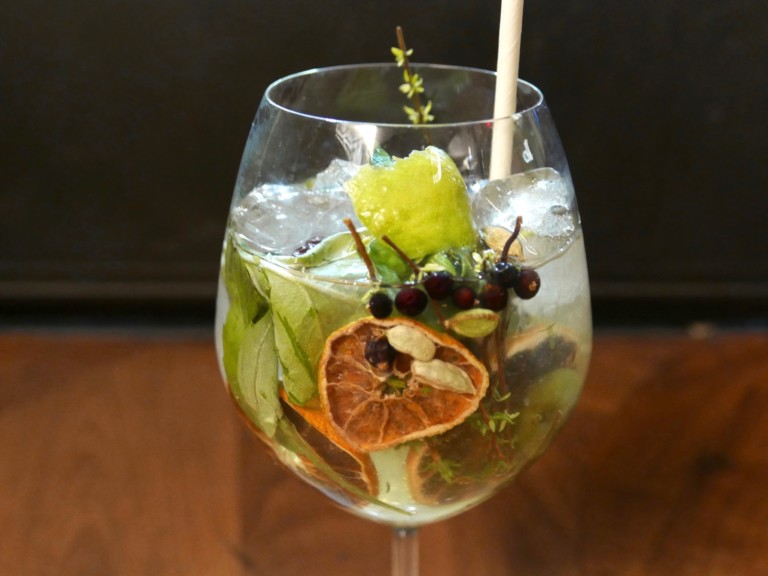
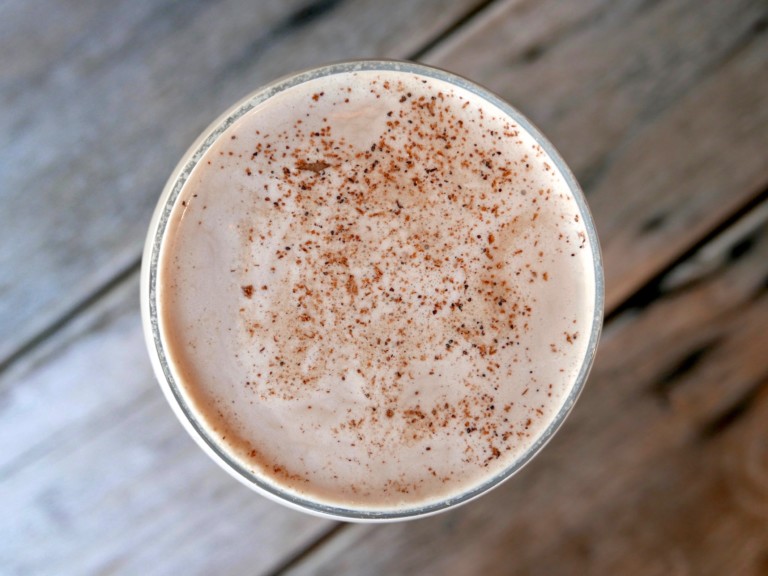




Blog Comments
Bloggers We Love: FoodGPS' Joshua Lurie Talks Food, Drink & LA's Infinite Possibilities | outside.in blog
August 16, 2010 at 11:56 AM
[…] Reza Esmaili was another interesting one. He’s President of the Northern California Chapter of the United States Bartenders Guild, and I met with him in San Francisco. Not only is he a bartender, he’s an owner/operator. He’s just taken over a place called Long Bar, and it was interesting hear him lay out what’s important [for that venture]. He has the ability to put together a great cocktail program [at Long Bar], but that wasn’t the priority to start. He’s been working behind the bar and on many other levels, so he’s got a historical perspective on the cocktail scene. There’s more context in his approach, and a personal history [that I found interesting]. […]
Restaurateur tops in commissioner race fundraising | Restaurant Industry
July 22, 2010 at 11:26 PM
[…] Food GPS » Q&A with restaurateur Reza Esmaili (Long Bar) […]
Tweets that mention Food GPS » Q&A with restaurateur Reza Esmaili (Long Bar) -- Topsy.com
July 20, 2010 at 6:57 PM
[…] This post was mentioned on Twitter by foodgps, stolichnaya. stolichnaya said: check it out Food GPS » Q&A with restaurateur Reza Esmaili (Long Bar): I remember my father and his friends sittin… http://bit.ly/cwcj1E […]